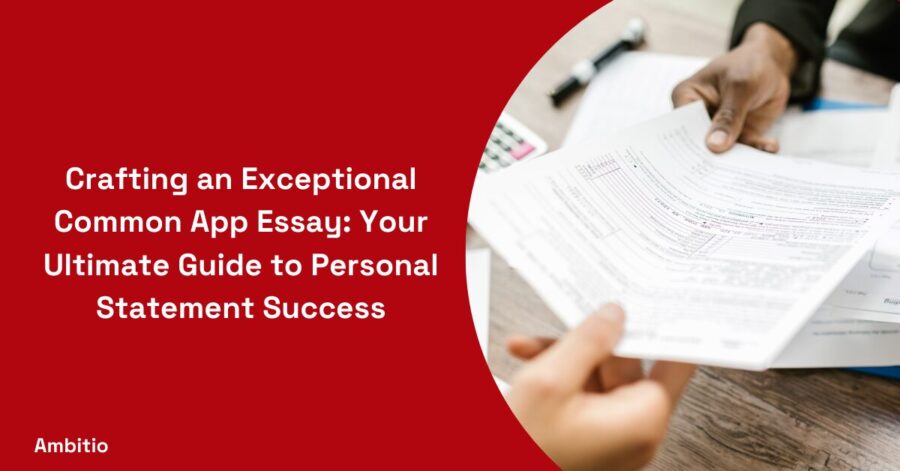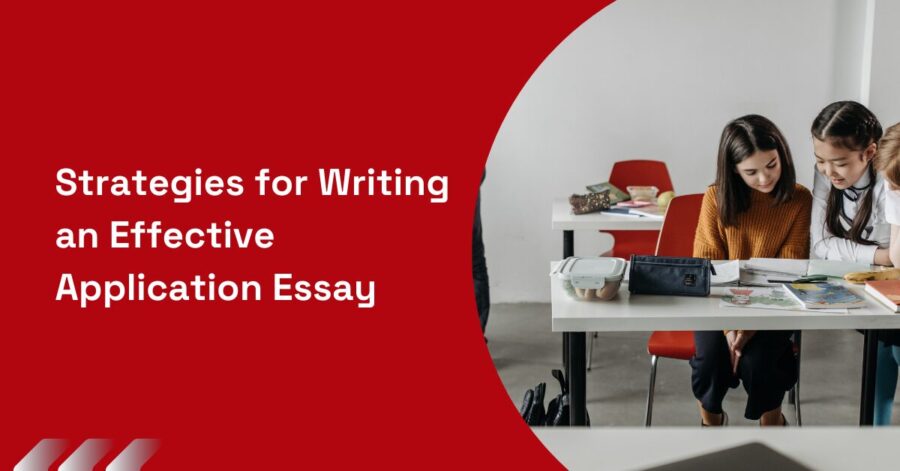13 December 2024
11 minutes read
Crafting an Exceptional Common App Essay: Your Ultimate Guide to Personal Statement Success

Introduction
The Common Application essay, a critical component of college admissions, is more than just a writing assignment; it’s a canvas for students to narrate their stories, ambitions, and perspectives.
This comprehensive guide is designed to demystify the process of crafting a compelling Common App essay, providing in-depth insights and practical advice to help you create a personal statement that resonates with college admissions officers.
Understanding the Common App Essay
Decoding the 2023-2024 Common App Essay Prompts
The Common App essay prompts are thoughtfully designed to evoke a range of responses, each offering a unique lens into the applicant’s life.
Understanding these prompts is the first step in crafting a personal statement that not only answers the question but also reveals your character and potential.
Prompt Analysis: Dive deep into each of the seven prompts for the 2023-2024 cycle, exploring what each seeks to uncover and how to approach them. Analyze what makes each prompt distinct and how to align your experiences and reflections with the chosen question.
Choosing the Right Prompt: This section will guide you in selecting the prompt that best aligns with your experiences and offers the most potential for a compelling narrative. Consider factors like personal relevance, the uniqueness of your story, and the depth of reflection each prompt allows.
The Art of Storytelling in Your Personal Statement
A well-crafted narrative can transform a simple essay into a compelling story. This section focuses on the art of storytelling, offering techniques to bring your experiences to life.
Crafting a Narrative Arc: Learn how to structure your essay with a beginning, middle, and end. Understand the importance of setting the scene, developing your story, and concluding with a resolution or insight.
Character Development: Discuss how to present yourself as a ‘character’ in your essay. This includes showcasing growth, learning experiences, and personal attributes through your anecdotes and reflections.
Using Descriptive Language: Enhance your essay with vivid, descriptive language that paints a picture for the reader. Learn how to use metaphors, similes, and sensory details to make your story more engaging and memorable.
Showcasing Personal Growth and Self-Reflection
The heart of a standout Common App essay lies in demonstrating personal growth and introspection. This section delves into strategies for highlighting these elements.
Identifying Moments of Growth: Guide on identifying and articulating key moments in your life that led to personal development. Discuss how to introspectively analyze these experiences and present them in a way that underscores your evolution as an individual.
Balancing Anecdotes and Reflection: Offer tips on balancing storytelling with self-reflection. Discuss how to intertwine narrative elements with insights to create a cohesive and profound essay.
Avoiding Common Pitfalls: Address common mistakes in writing about personal growth, such as being too vague, overly dramatizing, or missing the introspective element.
Crafting an Authentic Voice in Your Essay
Developing an authentic voice in your Common App essay is crucial for connecting with the admissions committee on a personal level. Your voice should reflect your unique personality, experiences, and perspective. Here’s how you can craft and maintain an authentic voice in your essay:
Understanding Voice and Tone
- Defining Voice: Your voice is the distinct personality, style, and point of view that is expressed in your writing. It’s how you, as an individual, come through on the page.
- Recognizing Tone: Tone refers to the attitude or mood of your essay, which can range from serious and introspective to light-hearted and humorous. It should match the content of your story.
Finding Your Voice
- Reflect on Your Speaking Style: Think about how you communicate verbally. Are you straightforward, humorous, formal, or conversational? Try to infuse your writing with similar characteristics.
- Writing Exercises: Practice free-writing exercises where you write about a topic without worrying about structure or formality. This can help you naturally discover your writing voice.
- Read Aloud: Read your essay aloud to see if it sounds like you. If something feels off, it might not be in your natural voice.
Maintaining Consistency in Voice
- Be Consistent Throughout: Ensure that your voice remains consistent from the introduction to the conclusion. Avoid sudden shifts in style or tone unless they are intentionally used to highlight a particular point.
- Voice Reflects Content: Adjust your voice to suit the content of your essay. If you’re discussing a serious topic, a more reflective and serious tone might be appropriate.
Expressing Individuality
- Highlighting Your Unique Perspective: Focus on aspects of your personality or experiences that set you apart. How do you see the world differently? What unique insights can you offer?
- Honesty is Key: Be honest and genuine in your storytelling. Authenticity resonates more than trying to fit into what you think colleges want to hear.
Avoiding Imitation
- Steer Clear of Clichés: Avoid overused phrases or ideas that can make your essay sound generic.
- Don’t Mimic Others: While it’s helpful to read sample essays for inspiration, be careful not to mimic other writers’ styles. Your essay should be a reflection of you, not someone else.
Using Language Effectively
- Choice of Words: Use language that feels natural to you. If you don’t use complex vocabulary in your everyday life, don’t overload your essay with it.
- Simplifying Complex Ideas: If you’re discussing complex topics, find a way to explain them in simpler terms. This not only shows clarity of thought but also keeps your voice relatable.
Embracing Vulnerability
- Share Personal Experiences: Don’t shy away from sharing personal or vulnerable aspects of your life if they are central to your story. Vulnerability can add depth and authenticity to your voice.
Seeking Feedback
- Getting Opinions: Have others read your essay and ask if it sounds like you. Feedback can help you gauge whether your voice is coming through as intended.
The Revision Process: Refining Your Common App Essay
The revision process is a critical phase in crafting your Common App essay. It involves refining your ideas, improving structure, and polishing language to convey your message effectively. Here’s a detailed guide to help you through this phase:
Step 1: Taking a Break
- Distance for Perspective: After completing your first draft, take a break from it. A few days away can provide a fresh perspective.
- Initial Reflections: Jot down initial thoughts about your essay’s strengths and areas for improvement.
Step 2: First Read-Through
- Read Aloud: Reading your essay aloud can help you catch awkward phrasing and run-on sentences.
- Focus on Structure: Look for a clear introduction, body, and conclusion. Ensure that each paragraph flows logically into the next.
- Highlight Key Points: Identify the main points in each paragraph. This helps to see if your essay stays on track.
Step 3: Seeking Feedback
- Choose Your Reviewers Wisely: Seek feedback from individuals who know you well and those who can provide an objective perspective.
- Teachers and Counselors: Educators can provide valuable insights into how your essay might be perceived academically.
- Peer Review: Friends can offer feedback on whether your essay sounds authentic and reflects your personality.
Step 4: Incorporating Feedback
- Evaluate Suggestions: Not all feedback will be equally useful. Evaluate suggestions against your essay’s objectives.
- Balancing Voices: Ensure that your essay retains your voice, even after incorporating feedback.
- Revision Iterations: Be prepared to go through multiple rounds of feedback and revision.
Step 5: Refining for Clarity and Cohesion
- Simplify Language: Eliminate jargon and overly complex sentences. Clarity should be a priority.
- Strengthen Transitions: Ensure smooth transitions between paragraphs and ideas.
- Check for Repetitions: Remove any repetitive points or phrases.
Step 6: Deepening the Content
- Enhance Reflections: Ensure that your essay includes introspective and reflective elements about your growth and learning.
- Add Vivid Details: Use specific details to make your story more engaging and memorable.
- Clarify Your Narratives: Make sure that any anecdotes or stories are clear and contribute meaningfully to your overall message.
Step 7: Finalizing the Tone
- Consistent Voice: Your essay should consistently reflect your personality, whether it’s serious, humorous, reflective, or a combination.
- Emotional Resonance: Ensure that your essay evokes the intended emotional response, whether it’s inspiration, empathy, or curiosity.
Step 8: Proofreading
- Grammar and Spelling: Check for basic grammar and spelling errors.
- Read Backwards: Reading your essay backward, from the last sentence to the first, can help catch errors.
- External Tools: Consider using grammar-checking tools, but don’t rely on them exclusively.
Step 9: Final Review
- Alignment with the Prompt: Ensure that your essay effectively addresses and stays true to the chosen prompt.
- Overall Impact: Evaluate the overall impact of your essay. Does it present a compelling narrative? Does it provide insights into who you are?
- Readiness for Submission: Confirm that your essay meets the word count requirements and adheres to any other submission guidelines.
Sample Common App Essays: Analyzing What Works
Analyzing successful Common App essays is a great way to understand what makes them effective. Here are several key components typically found in standout essays, illustrated with hypothetical examples for better understanding:
Example 1: Overcoming Adversity
- Theme: This essay might focus on overcoming a significant challenge, such as moving to a new country, dealing with a family crisis, or facing a personal setback.
- Effective Elements:
- Vivid Storytelling: The essay could open with a detailed scene setting the stage for the challenge faced.
- Personal Growth: It should highlight how the experience led to personal growth, perhaps in terms of resilience, empathy, or self-awareness.
- Reflective Insights: The conclusion might offer introspective thoughts on how this experience has shaped the writer’s outlook on life.
Example 2: A Unique Passion or Talent
- Theme: This essay might explore a unique passion or talent, such as a love for astronomy, an aptitude for a rare musical instrument, or involvement in beekeeping.
- Effective Elements:
- Engaging Introduction: The essay could begin with an anecdote that captures the student’s deep engagement with their interest.
- Connection to Personal Values: It should weave in how this passion aligns with the student’s values or aspirations.
- Broader Implications: The conclusion might tie the passion to broader life lessons or aspirations, indicating how it might be pursued or applied in college.
Example 3: A Moment of Realization
- Theme: This essay could center around a pivotal moment of realization, such as understanding the value of community during a volunteer project, or a moment of clarity about personal identity.
- Effective Elements:
- Descriptive Scene: Starting with a specific, vividly described moment can effectively draw readers in.
- Evolution of Thought: The essay should trace the evolution of the student’s thought process and how the realization came about.
- Future Orientation: Concluding with how this realization influences the student’s future goals or perspectives can add depth.
Example 4: A Creative Solution
- Theme: This essay might focus on a time when the student came up with a creative solution to a problem, whether in a school project, a community issue, or a personal situation.
- Effective Elements:
- Problem-Solution Framework: Starting with a clear description of the problem and then detailing the creative solution process can be engaging.
- Collaboration and Impact: If the solution involved teamwork, highlighting collaborative skills and the impact made can be effective.
- Reflection on Learning: Discussing what the student learned from the experience and how it applies to their future can provide a strong conclusion.
Example 5: Embracing Cultural Heritage
- Theme: An essay focusing on the student’s relationship with their cultural heritage, exploring topics like traditions, language, or experiences with cultural duality.
- Effective Elements:
- Cultural Insights: Descriptions of cultural experiences or traditions can provide a rich, engaging background.
- Personal Identity: The essay should explore how these experiences have shaped the student’s identity and worldview.
- Global Perspective: Concluding with thoughts on how this cultural understanding informs the student’s approach to global issues or interactions can be impactful.
Example 6: Overcoming a Fear
- Theme: This could be about overcoming a specific fear or phobia, like fear of public speaking, and how this journey contributed to personal development.
- Effective Elements:
- Emotional Engagement: Starting with an emotionally charged description of facing the fear can immediately engage readers.
- Steps of Overcoming: Detailing the steps taken to overcome the fear, along with setbacks, can make the story relatable and inspiring.
- Newfound Confidence: Ending with how overcoming this fear has opened new opportunities or changed the student’s perspective can be powerful.
Example 7: A Humorous Perspective
- Theme: An essay that uses humor to convey a meaningful story, perhaps involving a quirky hobby, a unique family tradition, or an amusing life experience.
- Effective Elements:
- Balancing Humor and Substance: While the essay can be light-hearted, it should still offer substantial insight into the student’s character or life experience.
- Narrative Arc: Even a humorous essay should have a clear narrative arc, with a setup, development, and satisfying conclusion.
- Self-Awareness: Demonstrating self-awareness and the ability to laugh at oneself can be very appealing to admissions officers.
In each of these examples, the key to success lies in the student’s ability to weave together narrative, personal insight, and reflection, creating an essay that is not only engaging and memorable but also deeply revealing of who they are and what they value. By analyzing these elements, you can gain a clearer understanding of how to structure and focus your own Common App essay.
Overcoming Common Challenges in Essay Writing
Writing a compelling Common App essay can be challenging. Here are some strategies to help overcome common obstacles:
- Dealing with Writer’s Block
- Break Down the Task: Divide the essay into smaller sections and tackle them one at a time.
- Freewriting: Set a timer for 10-15 minutes and write without stopping. Don’t worry about grammar or coherence; just get your thoughts down.
- Change of Scenery: Sometimes, a change in environment can stimulate creativity. Try writing in a different location.
- Mind Mapping: Use visual tools like mind maps to organize your thoughts and generate new ideas.
- Talk It Out: Discuss your ideas with friends, family, or teachers. Talking can help clarify your thoughts.
- Handling Sensitive Topics
- Be Honest but Respectful: If you’re writing about a sensitive topic, be honest about your experiences but respectful of others involved.
- Focus on Growth: Emphasize how the experience contributed to your personal growth. Avoid dwelling excessively on the negative aspects.
- Seek Feedback: Have someone you trust read your essay. They can provide perspective on tone and content.
- Stay Within Comfort Zones: Only share what you are comfortable having read by an admissions officer. Your privacy and boundaries are important.
- Staying True to Your Story
- Reflect on Genuine Experiences: Write about your actual experiences and thoughts. Authenticity is more compelling than exaggerated stories.
- Avoid Over-Dramatization: Keep your narrative grounded in reality. Over-dramatizing can detract from the genuineness of your essay.
- Embrace Your Unique Perspective: Recognize that your unique experiences and viewpoints are valuable. Emphasize what sets you apart.
- Balancing Creativity with Clarity
- Creative Introductions: Use creative hooks to grab attention, but ensure they are relevant to your overall story.
- Clear Structure: While creativity is important, maintaining a clear structure is vital. Ensure your essay has a logical flow.
- Balance Metaphors and Similes: Use metaphors and similes to add flair to your writing, but don’t overload your essay with them.
- Maintaining Focus on the Prompt
- Regularly Refer Back to the Prompt: Keep the prompt in mind as you write to ensure you’re addressing it directly.
- Use the Prompt as a Guide: Let the prompt guide your narrative, ensuring your essay remains relevant and focused.
- Check for Alignment: After drafting your essay, read it alongside the prompt to ensure alignment and relevance.
- Managing Time and Deadlines
- Start Early: Begin your essay well in advance of the deadline. This gives you ample time for revisions.
- Set Mini-Deadlines: Break the writing process into smaller tasks with their own deadlines (e.g., outline by week one, first draft by week two).
- Use Time Management Tools: Utilize calendars, planners, or apps to manage your time effectively.
- Editing and Proofreading
- Take Breaks Before Editing: After writing your draft, take a break before returning to edit. This provides a fresh perspective.
- Edit for Content First: Focus on structure, content, and clarity. Leave grammar and spelling for later.
- Proofread Multiple Times: Proofread your essay several times and, if possible, have someone else proofread it as well.
- Read Aloud: Reading your essay aloud can help catch errors and awkward phrasing.
- Seeking and Utilizing Feedback
- Choose Advisers Wisely: Seek feedback from teachers, counselors, or others familiar with college admissions.
- Be Open to Critiques: Constructive criticism can significantly improve your essay.
- Incorporate Feedback Judiciously: Use feedback to enhance your essay but ensure it still reflects your voice and story.
- Staying Motivated and Confident
- Set Realistic Goals: Set achievable writing goals to maintain momentum and avoid feeling overwhelmed.
- Celebrate Small Victories: Acknowledge and celebrate progress, no matter how small.
- Stay Positive: Maintain a positive mindset. Confidence in your writing will shine through in your essay.
By addressing these challenges with thoughtful strategies, you can create a personal statement that not only meets the requirements but also genuinely reflects who you are, enhancing your college application significantly.
Conclusion
The journey to crafting a powerful Common App personal statement is one of introspection, creativity, and meticulous revision. By understanding the prompts, employing effective storytelling techniques, showcasing personal growth, and maintaining authenticity, you can create an essay that not only meets the requirements but also captures the essence of who you are.
Remember, your personal statement is your opportunity to speak directly to the admissions committee, making a lasting impression that goes beyond grades and test scores. Embrace this opportunity to tell your story and make your application stand out.
FAQs
Q1: How important is the Common App essay?
The Common App essay is a crucial part of your college application. It’s an opportunity for admissions officers to understand who you are beyond your academic record and extracurricular activities.
Q2: Can I write about any topic for my Common App essay?
While the Common App prompts are broad, your chosen topic should connect back to the prompt and reveal something significant about you.
Q3: How long should my Common App essay be?
The Common App essay has a limit of 650 words. It’s important to be concise and focus on the most impactful details of your story.
Q4: Should I focus more on storytelling or reflection in my essay?
A balance of both is ideal. While personal stories captivate the reader, reflective insights demonstrate maturity and self-awareness.
Q5: How many revisions should my Common App essay undergo?
There’s no set number, but it’s crucial to revise until your essay effectively conveys your message and is free of errors. Feedback from others can be invaluable in this process.

You can study at top universities worldwide!
Get expert tips and tricks to get into top universities with a free expert session.
Book Your Free 30-Minute Session Now! Book a call now




























